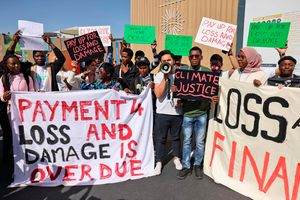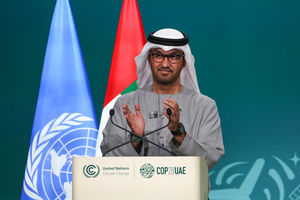Africa is staring at carbon colonialism, warns Kajwang

Chairperson Senate Public Accounts Committee Otieno Kajwang during the session at KICC, Nairobi on Monday, November 20, 2023. Kisii County Assembly appeared before the Committee.
What you need to know:
- Environmentalists say trees and plants are carbon-negative as they reduce the amount of carbon in the air.
- So industries that purchase carbon credits see this as a way of balancing out their carbon-intensive production processes.
As the COP28 entered the crucial stage of agreements, leading countries in the global north kept up the tradition. They held endless press conferences across the Dubai Expo Centre to proclaim their commitment to tackling the climate crisis, despite the global south insisting that progress had yet to be made.
Some delegates attending the summit were sceptical about the commitment to tackle the climate crisis, describing the slow progress as “a new form of carbon colonialism.”
The offsetting of industrial emissions through carbon credits came under sharp criticism, with some of the polluting global northern industries being accused of buying up land in the global south to plant trees or other flora.
In Kenya, President William Ruto, who the global north sees as the continent’s champion for clean energy because of his momentum demanding more funding at COP28, was forced to set the record straight on alleged land acquisition by a Dubai company.
“Kenya has not sold an inch of its land to any carbon credit company,” said Dr Ruto, dismissing reports that Dubai-based firm Blue Carbon had signed a framework of collaboration (FOC) with the Ministry of Environment and Climate Change that would see the government concede land for planting trees.
Environmentalists say trees and plants are carbon-negative as they reduce the amount of carbon in the air. So industries that purchase carbon credits see this as a way of balancing out their carbon-intensive production processes.
However, this approach has been criticised because it means large land areas in less wealthy countries are used to compensate for carbon-intensive industries in the rich world.
Many experts interpret this kind of deal as a pathway to a new form of colonialism by the rich countries as a way to continue emitting carbon instead of reducing emissions at source. Speaking at COP28, the chair of the Climate Change Committee in the Senate, Senator Moses Otieno Kajwang, said the arrangement favoured polluters. “There must be justice and fairness in carbon trading in developing countries as well as stiffer penalties for polluters who treat the Paris Agreement as suggestion rather than law,” said Mr Kajwang.
He spoke at the Inter-Parliamentary Union (IPU) conference that brought together over 500 parliamentarians, including dozens of Speakers from some 60 countries, to get first-hand data from climate experts and map out parliamentary actions to address the climate emergency, with 2023 confirmed to become the hottest year on record.
“It is emerging that the big boys in the polluters league are reluctant to take ambitious domestic action to reduce their emissions and instead prefer to net off using carbon offsets from African forest and range lands,” said Mr Kajwang.
The Homa Bay senator revealed that the carbon offsets by the wealthy nations are done under the guise of the Paris Agreement, which says that countries can sell emission reductions in the form of credits known as Internationally Transferable Mitigation Outcomes (ITMOs) to other countries or companies to use toward their targets. “This ITMO under article six of the Paris Agreement is in reality a new form of carbon colonialism.”
“You cannot oversight what you don’t understand. In Nairobi, during the African Climate Summit, we stressed the need for parliament to invest in capacity building on climate matters. Whereas funds for capacity building for MPs exist under the Green Climate Fund, various barriers have been erected, and these funds have not met their stated objectives,” said Mr Kajwang.
According to the World Bank Carbon Pricing 2023 report, revenues from carbon taxes and Emissions Trading Systems jumped by more than 10 per cent in 2022. The amount reached almost $95 billion globally.
In Kenya, these emissions are priced through fuel excise taxes. Kenya priced almost 94 per cent of its carbon emissions from energy use, and about 58 per cent were priced at an Effective Carbon Rate above EUR 60 per tonne of CO2.
EU Commission chief Ursula von der Leyen has been pushing hard to introduce global carbon pricing to hasten the transition to a net zero economy.
IPU President Tulia Ackson said: “Parliamentarians play a crucial role in addressing the pressing climate challenges of our time. The responsibility on their shoulders is immense and their decisions resonate beyond these walls and our institutions, shaping our shared future.”
IPU Secretary General Martin Chungong said: “This COP is a watershed moment for the IPU. For the first time, parliaments are now in the inner sanctum of the process and the negotiations after years of being on the sidelines. It’s encouraging to see parliaments and parliamentarians worldwide stepping up and coming together to share solutions to go further and faster to address the climate emergency.”
In September 2023, Kenya hosted the inaugural African Climate Summit, which declared the Nairobi Declaration as a common stand for African countries on the climate crisis.
Mr Kajwang said on the sidelines that the Kenyan parliament, in partnership with the Climate Vulnerable Forum, hosted members from 20 African parliaments to deliberate their role in their oversights of the Kyoto Protocol and Paris Agreement conventions.
“We registered concerns about the missed opportunities of carbon credit in developed countries, noting that the price and rules for carbon trading are still unregulated and the players and referees wear the same kit.”
“We hope the loss and damage fund will not have a similar architecture. We noted that the Paris Agreement and other climate treaties form part of the laws of most countries, yet they continue to be treated as suggestions rather than laws.”
“We therefore support calls to make violations of these laws justiciable, and we note that this jurisprudence is under consideration at the International Court of Justice.”
Mr Kajwang said MPs must ensure that indigenous and vulnerable communities are not exploited by the same laws passed.
“I hope that at this COP28, we shall continue to fight for our space as proverbial camels. We have put our heads in the green tent and hope that in the next COP, we shall be in the Blue Zone at COP29.”
This report was produced with support from MESHA and IDRC Southern Africa office





